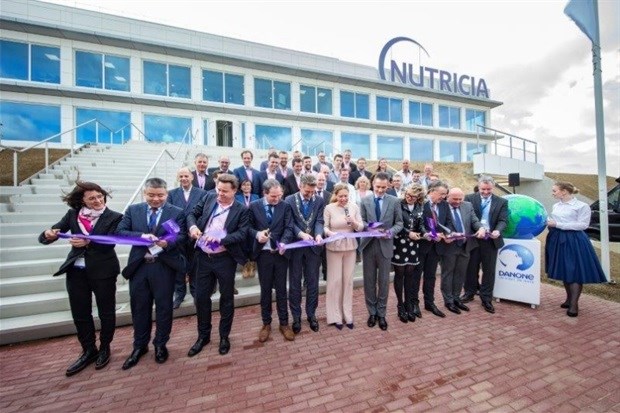Danone has opened a new Nutricia production facility in the Netherlands, to meet growing, global demand for specialised infant formula. The official ceremony held this week marked the completion of a three-year journey to build a state-of-the-art, energy-efficient, zero-waste plant.
The facility will primarily produce specialised infant formula that meets the needs of infants diagnosed with specific medical conditions – such as cow's milk protein allergy, as well as standard infant formula. The €240 million investment is among Danone's largest in its European production network in the last ten years.
The new Nutricia plant has been built to spec to further support the expansion of Danone's range of specialised infant formula products specially tailored for babies with specific health needs. The global prevalence of allergy, for example, is steadily rising, and approximately 2-5% of infants develop cow's milk protein allergy within the first year of life*.
The plant employs a specific manufacturing process** to produce foods for special medical purposes containing extensively hydrolysed protein to meet the specific nutritional needs of infants diagnosed with this type of allergy.
At full capacity, Nutricia Cuijk will produce more than 600 different products – including the Aptamil and Nutrilon brands – for customers in over 90 countries.
Doubling production capacity sustainably
The new facility will replace an older, existing plant in Cuijk, which the company will gradually phase out. According to Danone, the newly-built facility "uses advanced environmental technologies coupled with efficiently-designed manufacturing processes to ensure water and energy consumption, as well as CO2 emissions, are kept to a minimum".
Once at full capacity, the new facility will have double the production capacity of the legacy plant. Despite this, the new plant will use 60% less water, 25% less energy and emit 50% less CO2 than the legacy plant. To further minimise the new facility's carbon footprint, Nutricia Cuijk is powered by 100% renewable electricity.
Danone also targets reducing its full scope of carbon emissions. Therefore, Nutricia Cuijk sources dairy ingredients exclusively from western Europe – the world's region with the lowest dairy farming CO2 emission rates.*** Of these ingredients, a significant majority are sourced locally, from the Netherlands and neighboring Germany. The factory also embraces the principles of the circular economy – 100% of the facility's waste is recovered, including all packaging waste.
Once fully operational, the new facility will employ close to 500 staff and will – through indirect employment – support up to an additional 2,000 jobs.
"At Danone, we believe the health of people and the planet are interconnected, as expressed through our company vision 'One Planet. One Health'. Our new Nutricia Cuijk facility is a significant investment towards achieving that vision. At this facility, we'll be producing food for vulnerable babies; and we're also doing everything we can to preserve a healthy and clean environment for future generations," said Veronique Penchienati-Bosetta, executive vice president, Danone Specialised Nutrition.
* Renz et al., Nature, 2018.
** The Nutricia Cuijk plant employs a specific manufacturing process called hydrolysation. In this process, cow’s milk proteins are broken down – or ‘snipped’ – into smaller protein fragments. As a result, the immune system of a baby with cow’s milk protein allergy is less likely to trigger an allergic reaction.
***. FAO report “Greenhouse gas emissions from ruminant supply chains - A Global Life Cycle Assessment” 2013








































